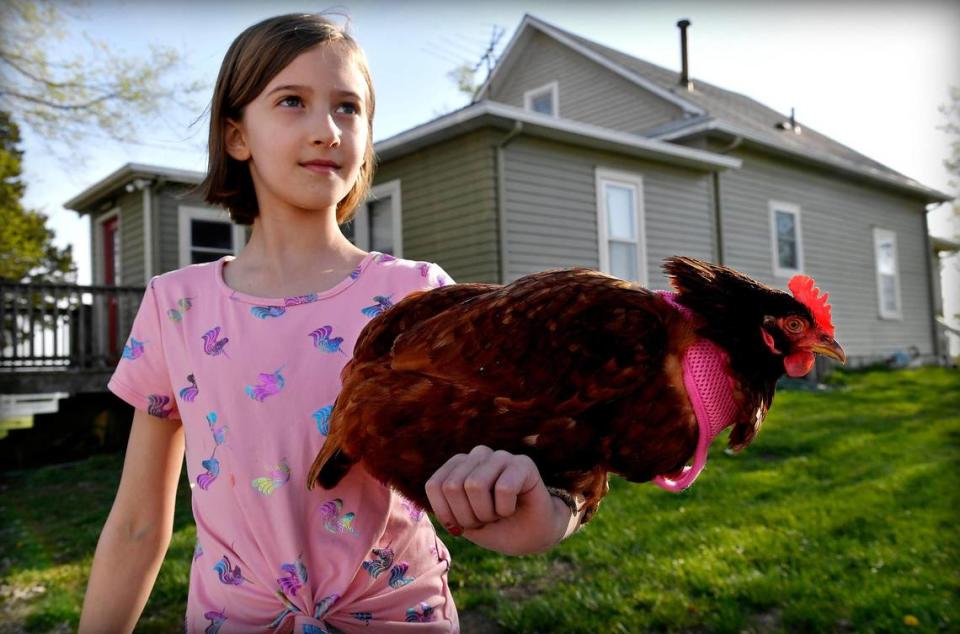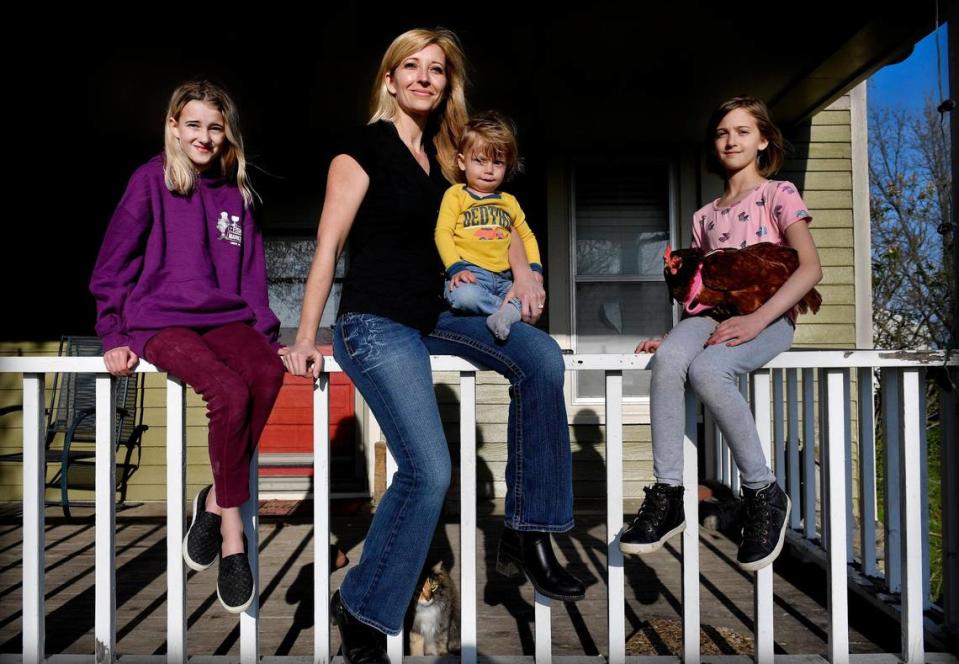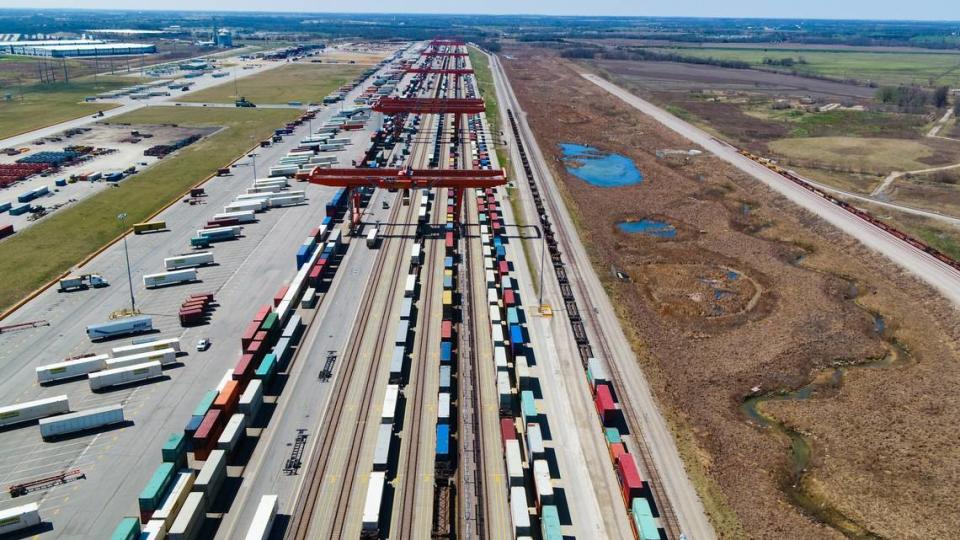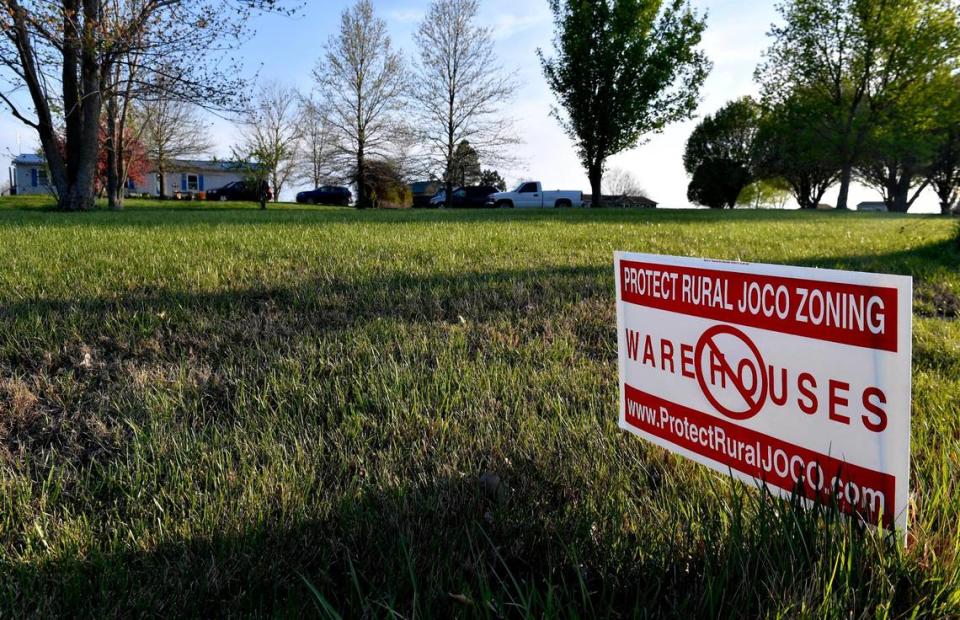Johnson County development invades their land. Their solution? Create their own town
Jennifer Williams moved to rural Spring Hill seven years ago in search of a quiet, safe place to raise her family. And that’s what she found. Her family grows vegetables in the garden and harvests apples, pears and plums from their small orchard.
Fargo, her black shepherd dog, chases the occasional car down Moonlight Road while cats nap in the sun and chickens patrol the freshly cut grass.
“People go on vacation to get what we have here,” she said.
But Williams and other neighbors in unincorporated Miami County say their slice of paradise is increasingly threatened by the ever-encroaching industrial development up the road in Johnson County. Huge warehouses and distribution centers continue to proliferate, bringing thousands of employees and constant truck traffic to rural roads.
The battle has been brewing for years along the county line. But now with a significant expansion proposed at the nearby industrial park in Edgerton, residents say they’ve been left with only one option to preserve some of the last remaining farmland: Form their own city.
This month, Williams filed a petition, with about 300 neighbors’ signatures, to create an entirely new city in Miami County.
Currently, the neighbors feel helpless against the industrial park’s growth. City leaders in Edgerton make decisions about zoning and annexations. And people like Williams, with no city council or mayor of their own, have little to no influence.

She thinks that could all change if her proposed city wins approval and people like her get to elect their own municipal government.
“As a community, we can preserve what we have, we can have a say, we can vote for who is making those decisions for us,” she said. “If we want a development at some point, we get to decide.”
Officials in Edgerton welcomed the 2013 arrival of the multi-modal Logistics Park Kansas City, a major hub of employment and a backbone of regional trade. But the tentacles of that development have now reached far beyond the 400-acre cargo facility for trains and trucks.
The industrial park spans across dozens of buildings, occupied by corporate giants like Amazon, UPS and Hostess. It has grown so quickly that developers are expanding the park south of Interstate 35, where nearly 800 acres of land are now being proposed for warehouses.
On Thursday, the City Council will vote on whether to rezone the majority of those acres from rural to industrial land.
If approved, that would mean residents like Williams could soon walk down their driveway and see a tall wall of concrete instead of open, green pastures.
“They’re going to take away our sunset,” neighbor Jenni Koch said.
Neighbors in unincorporated parts of Miami and Johnson counties have fought with futility as Edgerton annexes more and more land to bring warehouses and distribution centers under the footprint of NorthPoint Development, a national developer of commercial and industrial projects based in Riverside in Kansas City’s Northland.
Edgerton and Johnson County leaders have often said that their hands are mostly tied. They say that development is inevitable in the furthest reaches of Kansas City’s booming suburbs. That the developer owns the land. And that they can’t deny zoning requests and development proposals without good reason.
James Oltman, president of ElevateEdgerton!, a public-private partnership aimed at attracting development, argued that the industrial park has overwhelmingly benefited the entire region. It’s brought 4,800 jobs and millions of dollars in tax revenue, attracting national attention to this tiny town of 1,700 residents.
“The city of Edgerton and ElevateEdgerton! don’t get to decide where the growth happens. We’re not the developer. The land is not owned by the city,” Oltman said. “And a lot of it depends on finding landowners who are interested and in agreement to sell their property as well.”
“With the trends and amount of activity that we’re seeing, we obviously know that growth is going to happen. Now it’s just trying to plan it out in a way that’s possible given those constraints.”

But hundreds of residents — nearly 3,000 have signed an online petition protesting the industrial park’s expansion — say it’s time for city leaders to say “no” to NorthPoint. Residents have accused City Council members and Mayor Donald Roberts of prioritizing corporate interests above their own — a claim the city officials have fought back against.
And the first of what residents say will be many lawsuits was filed this past week against the city.
Roberts declined to be interviewed for this story. NorthPoint leaders did not return multiple requests for comment. Some City Council members also declined or did not respond to requests for interviews.
“From our perspective, we’ve done a lot of good as partners with Edgerton over the years,” Patrick Robinson, NorthPoint’s vice president of acquisitions, said at a recent council meeting. “And we’re proud to play our part in that, and we’d like the opportunity to continue that.”
“We believe there’s a lot more demand, and Edgerton is going to continue to be the epicenter of the Kansas City trading hub.”
Many residents who live outside of Edgerton’s city limits feel they are left to either sell their land to industrial developers or stay put, sandwiched between warehouses. If NorthPoint wants to buy their property or nearby plots, they believe, Edgerton will move to annex their land too and pave the way for further development.
But, perhaps not if residents successfully create their own city.
“We’re not against progress or jobs or warehouses. But this is all around us. We know what’s coming,” Koch said. “This is our forever home, and we don’t want to be in an industrial park. Neither do our neighbors. We just have to do something.”

The city of Golden
Forming a new city is a rare event in Kansas, where only five new towns have been incorporated since 1980, according to the Kansas League of Municipalities. It’s up to county commissions to approve the incorporation of rural land.
The last city to form was Highlands just outside of Hutchinson in 2017. In recent years, it’s been more common for small towns like Freeport and Frederick to seek to disband.
“We’ve never experienced this,” said Miami County Commission Chairman Danny Gallagher. “It’s all new.”
The Miami County Board of Commissioners at last Wednesday’s meeting acknowledged receipt of the petition and set a June hearing date.
Gallagher wouldn’t say how the commission will respond to the request to create the new town.
But he noted that Miami County residents who responded to a recent planning survey cited the rural atmosphere as the top reason people live in there — more so than the cost of living, jobs or the county’s proximity to Kansas City. Residents also identified preserving the area’s farming, wide-open spaces and rural lifestyle as the most important factor in weighing future development.
“A lot of people move to Miami County because of the quietness and the rural lifestyle,” he said. “They don’t want a lot of big, big businesses here.”
Residents hoping to preserve their land have proposed a name for their new city: Golden.
The city of Golden would include about nine square miles. It’s all territory just outside some other place: Spring Hill in one direction, Gardner and Edgerton in another.
Williams said that the city would have 776 residents and might be home to more cows than people. While there are some subdivisions, most of the area is scenic pasture and fields dotted by homes on large lots, including some selling for about $500,000.
Williams, who said she plans to run for mayor of the new town, doesn’t envision a city hall or a town square. She thinks Golden would only need a small property tax levy to pay for expenses like a city attorney.
Law enforcement from the Miami County Sheriff, rural water services and fire protection from the existing rural department would remain the same.
The proposed name comes from one of the state’s most important planning and zoning court cases. In Golden vs. City of Overland Park, Donald Golden sued after the city denied his request to rezone his property at 87th Street and Metcalf Avenue from offices to retail. In 1978, the Kansas Supreme Court ruled on the so-called “Golden factors” — the criteria that local governments must consider when weighing zoning decisions.
Edgerton city officials have been debating those eight factors to determine whether to approve rezoning the 770 acres for industrial development — much of which was annexed into the city in December.
Overwhelmingly, residents have argued that allowing the warehouses near their homes would go against that criteria because it would not fit with the character of the neighborhood.
“The Golden criteria is all about how a new development fits in with the area that already exists,” said Charlie Koch, Jenni Koch’s husband. “Edgerton has said these warehouses are going to be very similar to other warehouses built in Logistics Park KC. But it ignores the fact that the whole development would be surrounded by our residential area.”
“Incorporating our own city is really the only way to have any say in the matter at all.”

‘Why not be truthful?’
Charlie Koch grew up on his parents’ 80-acre farm, exploring the nearby woods and camping under the stars.
After he and his high school sweetheart, Jenni, finished college, they decided to return home and build their own house on a piece of the property.
That was in 2013, when the industrial park was starting to take shape roughly seven miles away. That year, BNSF Railway’s $250 million intermodal facility became the anchor of the complex.
The couple knew change was coming. But the development was far enough away, closer to U.S. 56 highway and the city of Edgerton. And they felt reassured after local leaders published a regional plan for southwest Johnson County that November.
The plan, done in partnership with the Kansas Department of Transportation and Mid-America Regional Council, presented three development scenarios, ranging from low industrial build-out to high-density development. In all three scenarios, leaders emphasized preserving the land south of I-35, where the city of Golden is now being proposed.
“Very low intensity use is the desirable future for this part of the study area because of topography, existing residential use patterns, high cost of providing urban infrastructure to this area, and the availability of other land to meet projected urban development demands,” the plan states.
“We had confidence in that plan,” Charlie Koch said. “It says a warehouse is not supposed to be right here on top of us.”
But the industrial park took off faster than anyone expected, quickly filling up the 1,700-acre land north of the interstate. In 2018, Logistics Park added warehouses south of I-35 for the first time, on roughly 575 acres that are now home to Hostess and Kubota Tractor Corp. — in what is considered the second phase of the industrial park development.
The Edgerton City Council at the time approved an incentive deal, offering a 10-year, 100% property tax abatement for all projects that are part of the second phase.
Now NorthPoint is proposing at least 11 more warehouses south of the interstate, totaling nearly 10 million square feet, east of Gardner Road, from 199th Street to the Miami County line.
“We would be a quarter-mile away from the warehouses,” Charlie Koch said. “You turn left out of our driveway and it’s right there.”
Many neighbors say they were blindsided by NorthPoint’s plans to build on the land. They accuse the developer and city leaders of advancing the project in secret, although officials deny that.
City Administrator Beth Linn told The Star that Edgerton has followed the legal process required to notify residents of the annexations and rezoning requests.
“This was a voluntary contiguous annexation, meaning that the property owner of the land adjacent to the Edgerton city limits requested to be annexed into Edgerton. Any property owner has the right to request annexation into an adjoining city,” she said.
But neighbors have repeatedly raised concerns about the company’s tactics.
Rather than purchasing property under its own name, NorthPoint has created various limited liability companies to make land transactions. Those include Hillsdale Land and Cattle, East Kansas Land and Cattle, and South JoCo Farms.
“It is very common in the development industry to do it exactly that way. The land is purchased under some type of holding company and the developer is free to do that,” Oltman said. “There’s nothing unethical about that. There’s nothing sneaky about that. It’s just common practice.”
Some neighbors said they assumed that actual farms or cattle companies were buying up the land near their homes.
“Why not be truthful with people?” Connie Mayberry said during a March 11 meeting. “It’s very evident that NorthPoint can’t be truthful and is not a good neighbor.”
She told Edgerton officials that her parents were tricked into selling some of their property to NorthPoint after being told it would be developed into homes. Had they known who was actually buying it and for what purpose, they wouldn’t have sold, she said.
“This is fraud,” Mayberry said.

A battle ahead
Neighbors were hopeful last month that Edgerton leaders might reject NorthPoint’s request to rezone the rural land to make way for more warehouses.
The city’s Planning Commission seemed sensitive to residents’ concerns. In February, the body recommended that the Edgerton City Council deny rezoning requests for the majority of the acreage — but it has since reversed that decision.
Residents shared fears about increased truck traffic, which already is taking over the area’s gravel and two-lane roads. Last year, a truck driver died when he got out of his truck and was struck by a car at 207th Street and Gardner Road — not far from where the proposed warehouses would be built.
Most officials acknowledge that the roads were not designed to handle heavy semi-truck traffic, and that changes are needed. Johnson County Commissioner Shirley Allenbrand, who represents the southwest part of the county, said she is working with city leaders to develop a regional transportation plan to address the problems.
“My heart breaks for those people because they’re out on farms and want to be there. But all of a sudden, they’ve got trucks and development going on,” Allenbrand said. “But you can see the direction that it’s going, and you can’t stop it. It’s all legal.”
Residents also worry about noise and light pollution, as well as the degradation of the area’s natural resources. Last month, Chris Cardwell, an urban conservationist with the Miami County Conservation District, told the City Council that the development could cause irreparable harm to the Hillsdale watershed, which is the source of drinking water for more than 56,000 people.
And many neighbors have questioned whom city leaders are serving: their constituents or NorthPoint. They point to the mayor’s pay raise in 2018, which brought his $1,000 annual salary to $90,000 — as well as the campaign donations he has received from people associated with NorthPoint. Roberts has previously defended officials’ intentions and highlighted the importance of recruiting new development and tax dollars to the city.
Proponents argue that the benefits of the industrial park’s expansion outweigh the growing pains. They point to the thousands of well-paying jobs and the additional tax revenue going to the school district, county and city.
Several industrial park workers spoke at the City Council meeting in March in favor of the expansion, saying that their families’ lives have drastically improved thanks to the stable employment. And developers expect more jobs as there is more demand in the e-commerce industry.
Oltman said many of the industrial park’s workers make a 30-minute commute from all directions to work there, benefiting the entire region. He said Edgerton residents have seen lower city tax rates, as well as millions of dollars invested in improved streets, new trails and the addition of railroad quiet zones, so train horns aren’t heard in town.
At the same time, Edgerton’s population has remained flat, which city officials say is not for a lack of trying to attract housing developers. And its downtown has hardly been touched, with one main street of brick buildings, City Hall, a bank, post office, library and church.
In 2018, a Dollar General store opened to much enthusiasm in the town that has struggled to attract commercial business. During this year’s state of the city address, the mayor highlighted the construction of a new trail so residents can walk from the gas station to the discount store.
Now Oltman says the industrial park’s first truck stop is being constructed, which is expected to have space for a Goodcents Deli and other restaurants. The thousands of employees have had essentially nowhere to shop, eat or service their trucks within Edgerton.
He hopes that more commercial businesses will follow.
“Edgerton should have gold sidewalks with all that they’ve done. It’s crazy,” Jenni Koch said.
After the Planning Commission initially recommended denying most of the NorthPoint rezoning, the matter moved to the City Council. Last month, a caravan of pickup trucks and SUVs, filled with people holding signs and wearing red “No to NorthPoint” T-shirts, gathered outside of the town’s tiny City Hall.
The City Council approved the rezoning of more than 130 acres, saying it was allowable under the Golden criteria. It sent the rest of the requests back to the Planning Commission, with officials arguing that commissioners did not provide clear enough reasoning using the Golden factors to recommend denial.
In the end, the Planning Commission on Tuesday reversed its decision, recommending the City Council give NorthPoint the go ahead for the remaining 640 acres.
The City Council will make the final decision on Thursday.
In the meantime, opponents are fighting the development from several angles. This past week, some neighbors filed a lawsuit against the city for the land the council agreed to rezone last month. More lawsuits are likely to come, neighbors said.
Regardless of Thursday’s City Council decision, residents in the unincorporated part of the county say they will move forward with trying to create the new city of Golden.
The neighbors are optimistic that it will be approved when Miami County commissioners consider the proposal in June, but they do see one potential obstacle: Edgerton could object.
“We’ll never be in their town. We’re basically touching the border of Edgerton now, and we have no say in anything they do. It’s such a helpless feeling,” Jenni Koch said. “So that’s why we’re doing what we’re doing. We’ll have our own town and we’ll be able to block them. We’re saying no more.”

